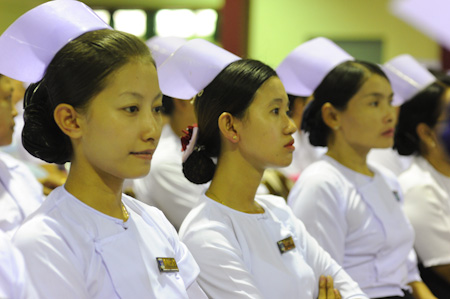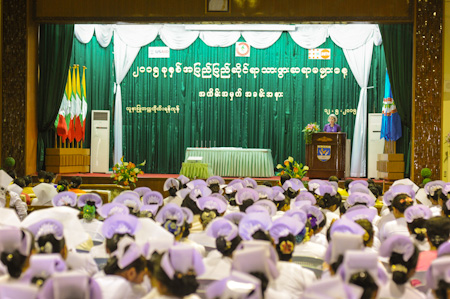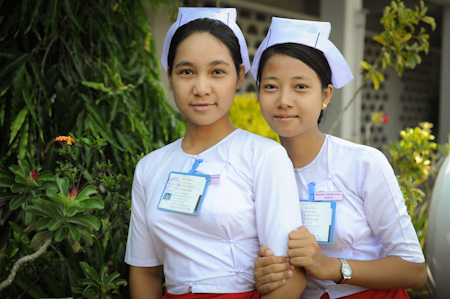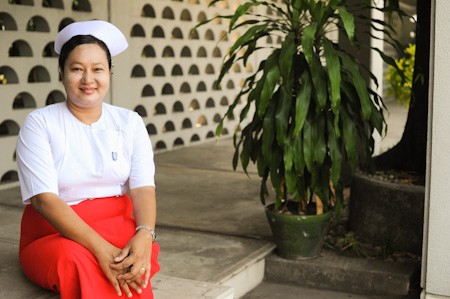More than 500 midwives from the Yangon region, all dressed in their bright red longyis and white hats, the tell-tale sign of Myanmar’s midwives locally known as the “Red Angels,” marked this year’s International Day of the Midwife at an official event held on 12 May in Yangon.

The commemoration event which was jointly organized by the United Nations Population Fund (UNFPA), the Myanmar Nurse and Midwife Association (MNMA) and Jpheigo took place at the Nurses University in downtown Yangon under this year’s slogan “Midwives: for a better tomorrow”. It was the third time Myanmar marked this occasion.
Ms. Janet Jackson, UNFPA Representative in Myanmar said in her opening remark that midwives play a vital role in providing basic maternal health to communities, and that properly trained midwives are crucial to improving the quality of services of pregnant women, new mothers’ and newborns. Evidence shows that midwives who are educated and regulated to international standards can provide 87% of the essential health care needed by women and their newborns. “Every 4 days in Myanmar, 10 women die of birth-related causes. Stopping this tragedy is surely within the grasp of Myanmar. Improving access to contraception in itself will prevent one third of these deaths, and improving midwifery skills for much of the remainder. This therefore is manageable and within Myanmar’s grasp,” said Ms. Jackson, referring to the fact that globally nearly 800 women continue to die every day from complications of pregnancy and childbirth.
Ms. Jackson who herself started her career as a highly skilled midwife stressed that midwives do more than deliver babies. Midwives also provide other life-saving reproductive health information and referral services, including ante-natal, delivery and post natal care, basic emergency obstetric care, family planning, post abortion care, protection and prevention of mother-to-child transmission of HIV, sexually transmitted infections (STIs) and basic health care. “Our goal is to reduce instances of maternal deaths and child deaths in Myanmar, including improve the health statues of all mothers and children. UNFPA is confident with the recent upgrading of the midwifery education from 18 months to a two year diploma course, Myanmar is on the right track in boosting its maternal and reproductive health services overall,” said Ms. Jackson.

With the support of UNFPA and in cooperation with the Myanmar Nurse and Midwife Association (MNMA) and the Ministry of Health (MoH), midwives are every day contributing to reducing maternal mortality, which remains high in Myanmar with 200 maternal deaths per 100,000 live births. This means that about 863 women die because of pregnancy related causes every year in Myanmar. “This is hardly talked about. These women are not visible. But if this totality of deaths were to occur at once, equal to 17 full 50-seater bus accident fatalities then this would be alarming and would become a news headline. The public would want to know why such a scale of loss had happened. Reviewing maternal deaths in a systematic way every year at all levels of the health system, would help bring attention to avoidable maternal deaths and galvanize the health system to strengthened action to prevent this avoidable tragedy,” said Ms. Jackson .

In comparison to its ASEAN neighbors Myanmar is currently ranked as the second highest in terms of maternal mortality. Only Laos is ranked slightly higher with 220. Official data from the Myanmar Ministry of Health and World Health Organisation (WHO) 2013 data Review in Myanmar, estimate maternal mortality rates to be 863, which can also be equivalent of 16 loaded school buses. Data also indicated that in 2013 Myanmar had 835,595 live births.
Ma Khaing Mai Oo, 18 year-old and trainee midwife from Yangon attend the commemoration and said that she was very proud to be a midwife. She added that she was currently in her first year of completing the two-year midwifery education and that her older sister was also a midwife. “The reason why I decided I wanted to become is midwife is that I wanted to help save not just one life, but two.” Even though Ma Kahing Mai Oo has yet to deliver her first baby by herself, she is keen to absorb every moment of the training and acquire the needed qualifications in order to become a qualified midwife. “When I graduate I would love to be deployed to either Shan or Rakhine state,” she said.
At the commemoration event five midwives shared testimonies from an event or success story, which had made a real impression on them from their work. The five midwives were subsequently presented with an award for their contribution in carrying out their duties. After the award ceremony there was a demonstration simulating hands on training of a delivery, much to the amusement of the participants.

Daw Myat Than Soe, 41 year-old midwife and mother of three children herself, has been working as a midwife for 21 years. When asked what advise she had for young trainee midwives, she said that she hoped that midwives would one day elevated to a higher level, that of nurses. “Midwives give advice to expectant mother and help bring life into this world. They should be and should be at the same level as nurses.”
Currently, the Myanmar midwifery profession is ranked below of nurses and seen as an entry point for nurses. UNFPA is working with the government to ensure that midwifery becomes a profession in its own right, including the expanding of their skills set by widening their current scope of work to include tasks normally undertaken by nurses such as administering injections, blood taking and analyzing and distribution of family planning commodities.
The International Day of the Midwife is observed globally on 5 May.





